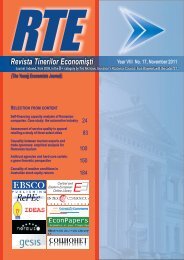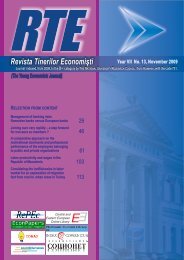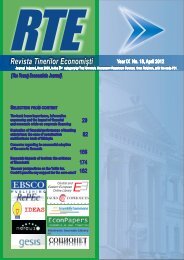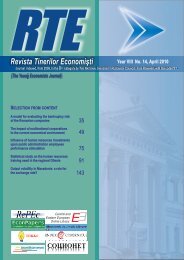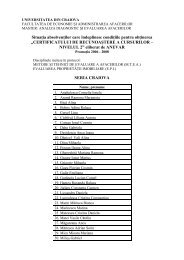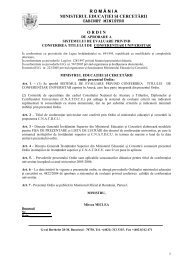Revista Tinerilor Economiºti (The Young Economists Journal)
Revista Tinerilor Economiºti (The Young Economists Journal)
Revista Tinerilor Economiºti (The Young Economists Journal)
Create successful ePaper yourself
Turn your PDF publications into a flip-book with our unique Google optimized e-Paper software.
<strong>Revista</strong> <strong>Tinerilor</strong> Economişti (<strong>The</strong> <strong>Young</strong> <strong>Economists</strong> <strong>Journal</strong>)<br />
consumption growth was not followed by employment growth.<br />
Based on the statistical analysis carried out with the Pearson correlation<br />
coefficient we can notice that consumption, as the main component of aggregate<br />
demand, in Romania, does not influence positively the level of employment. <strong>The</strong><br />
negative value of the Pearson correlation coefficient of -0.595 proves that between the<br />
two economic variables there is a inverse relationship, of average intensity, fact that is<br />
in contradiction with the Keynes’s theory according to which employment growth is<br />
caused by consumption growth and the other way around (between the two variables,<br />
regularly being a direct relationship).<br />
Source: Own calculations based on the data in Annexe no. 1<br />
Figure no. 3 Inverse correlation between final consumption and civil employment,1990-2009<br />
Taking into consideration that, in Romania, in the analysed period, the<br />
consumption growth did not cause the employed population growth, on the contrary there<br />
was a decrease of the employed population, in our opinion stimulating consumption in<br />
Romania aiming to increase the level of employment is not the best solution [1].<br />
In order to support this statement we mention the fact that meeting consumption<br />
needs, is done by the consumption of domestically produced products as well as the<br />
consumption of imported products. Based on the statistical data on the evolution of<br />
consumer goods import we can notice that, in Romania, the contribution of the imported<br />
consumer goods to meeting the domestic demand for consumer goods lately, and not<br />
only, has increased significantly. Thus, in the 2002-2009 period, an increase in the<br />
imported consumer goods of 2.5 times was recorded, from 2782.2 mil euro to 7038 mil<br />
euro [8], thing that reflects the high preference for the consumption of these goods.<br />
Meeting consumption by means of the imported consumer goods does not<br />
provide the necessary conditions for job creation in our country, because the reduction<br />
of the domestic supply for goods and services by substituting domestic output with the<br />
supply coming from imports has as a result the employment reduction. <strong>The</strong>refore, the<br />
growth of import may equal the loss of jobs internally, importing not only goods and<br />
services but also unemployment, and other macroeconomic disequilibrium: deficit of<br />
trade balance and balance of payments, national currency depreciation etc.<br />
<strong>The</strong> negative relationship between employment and consumption can be<br />
explained by the factors that lay at the foundation of consumption growth in Romania.<br />
Consumption is caused by a series of factors, such as: disposable income, general level of<br />
prices, fiscal policy, interest rate etc.<br />
136



